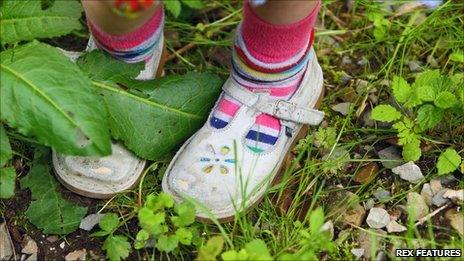Should we learn to love weeds?
- Published

They are the scourge of farmers and allotment holders the world over. But, as one naturalist pens a book in defence of weeds, should we see them in a new light?
Mention chickweed to my grandmother and her scowl - provoked by years of backache at the hands of her gardening nemesis - was instant.
That look is mirrored by woodland managers whenever they stumble across new shoots of rhododendron. And don't even whisper "Japanese knotweed" near those clearing the site for London's 2012 Olympics., external
However, to naturalist Richard Mabey, weeds are not merely pernicious invaders, out to torment those who till the land. His first publishing job, west of London, was in a "labyrinth of breakers' yards, abandoned factories and filled gravel pits which was a riot of weeds," he explains.
"I just thought they were the most amazing, exultant plants, that were changing the environment for the better."
Nearly half a century later, the 69-year-old's view is unchanged.
His latest book, Weeds: How Vagabond Plants Gatecrashed Civilisation and Changed the Way We Think About Nature, extols their oft-overlooked beauty, with references to poetry and painting.
And it praises their usefulness in food, medicine and industry.
But Mr Mabey goes further, saying weeds' resilience makes them "unconscious pioneers, growing first in disturbed land", such as bomb sites after the blitz.
He defends cogon grass, cursed for running riot in parts of Vietnam laid bare by American chemicals during the war in the 1960s. Other forest plants have been much slower to recover but Mr Mabey believes it is better that something, at least, is growing.
His conclusion that nature is "much more resilient" than its common portrayal puts him at odds with many peers.
But surely he won't defend those alien invaders, Indian Balsam and Japanese knotweed introduced to decorate Victorian gardens and now running rampant at an annual cost of hundreds of millions of pounds in clearance?
While Mr Mabey acknowledges their damaging effect, he says native plants may just fight back anyway.
He cites the example of Dunton Plotlands in Essex, a 1930s self-built estate. Later abandoned, they became overrun with unchecked garden plants.
But Mr Mabey says: "Over the last 40 years, native trees have begun to overtake these invasive plants."
The author is at pains to say he is not advocating free rein for weeds but adds: "The idea that these things have wiped out English plants is only true in the short-term."
Many define weeds as "plants in the wrong place" but just where that place depends on whether you're a gardener, farmer or conservationist.
Dr Bob Froud-Williams, of the European Weed Research Society, says much academic work focuses on controlling weeds in agriculture.
"Without weed control, crop yields could be badly hit or - in worst-case scenarios - wiped out altogether," says the University of Reading lecturer.
Black grass, a British native annual weed, could be expected to halve the yield of a cereal crop if left unchecked. However, he says management - rather than eradication - can be advantageous, such as with "companion plants".
"The idea is that you use weeds as decoys to attract insect pests or, alternatively, because they give off certain deterrents," he says. "But the key is to keep them in balance and with agriculture."
Some practices, such as using high levels of fertiliser, can help weeds proliferate and become more competitive, he says.
Citing philosopher Ralph Waldo Emerson's opinion that a weed is "a plant whose virtues have not yet been discovered", Dr Froud-Williams says they fulfil an important environmental role.
"With concerns over the decline in bee populations, weeds are an important source of nectar and pollen, particularly when a number of crop species are unavailable."
Their importance in food webs is highlighted by the declining farmland bird population, attributed by some to herbicide use.
This has been acknowledged through European funding for farmers who leave uncropped margins to aid wildlife. Some such agri-environmental schemes have had startling results.
Andy Byfield of Plantlife, a charity campaigning to preserve Britain's struggling species, says one Kent farmer agreed to stop spraying herbicide on an entire arable field.
Within three months 10,000 broad-leaved cudweed plants had sprouted - the second-largest UK population of this endangered species - along with various poppies.
Mr Byfield says the seeds of cornfield plants can lie dormant in this way for decades, or even centuries.
But despite their resilience, he disagrees that Britain's indigenous plantlife will survive the invasion from "sprawling, smothering" species from "over the garden fence". The UK's limestone cliffs are being populated by Mediterranean and Chinese species, such as holm oak and cotoneaster.

Rhododendrons: Beauty, or beastly weed?
And while some native plants may take seed in the area, Mr Byfield believes the native grasses they oust will be gone for good.
"I simply can't believe that these places will miraculously recover," he says.
However, with a great unknown remaining over the extent to which the UK will be affected by any climate change, Mr Mabey has one final word.
"There might come a time when we're grateful to some of these invasive plants because they will move into places which have been vacated by native species."